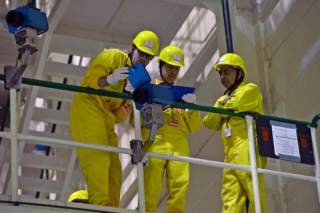We Can Verify This Deal
A veteran nuclear inspector says the Iran deal "can be made to work"—even if Iran cheats.
For this agreement to work, the United States and the IAEA will have to maintain a focused, constant attention to its workings. The IAEA and its director general have shown remarkable discipline during the last five years in countering Iran’s efforts to frustrate and sidetrack demands for clarification of past Iranian nuclear activities and access to ongoing nuclear programs. And the United States across two administrations has led the international community to adopt strict economic sanctions that finally forced Iran to the bargaining table. This is more remarkable given the IAEA’s less-than-stellar record under its previous leadership in Iraq, North Korea and Iran itself. The proposed deal will require that the IAEA continue to stand steadfast behind rigorous inspection even after the current director general has left the scene.
The United States itself will face challenges to maintaining constant vigilance on the workings of this deal. Over its fifteen to twenty-five year duration, this deal could see as many as six American presidents, an untold number of Directors of National Intelligence, CIA directors, secretaries of state and defense, national-security advisers, and congressional leaders. The United States also will face both old and new security challenges during this period, and it remains an open question as to how scarce national intelligence and military assets will be prioritized. It is easy to say now that Iran, its nuclear activities and regional moves to displace U.S. influence will remain a central priority. Given uncertainties with regard to Russia, China, cyber, terrorism, failing nations and so forth, this is far from certain forever.
This deal can be made to work. At a minimum, it will substantially increase the time it would take Iran to develop and deploy nuclear weapons and the warning time the United States would have if Iran were to move forward to gain nuclear weapons during the next fifteen years. The real and very open question is how Iran will use this time.
The task for American diplomacy as this deal goes forward is to make clear to Iran the substantial risks and costs that it will face, and the benefits it would lose, if it fails to use the opportunity provided by this breakthrough deal.
David Kay led the UN inspection after the first Gulf War that uncovered the previously unknown Iraqi nuclear program and, after the most recent Gulf War, led the CIA's Iraq Survey Group that determined that there had been no Iraqi weapons of mass destruction at the time of the war. He is now a private consultant in Washington, D.C.
Image source: IAEA.

